Stephen’s Op-Ed regarding the child sex abuse scandal rocking Penn State appears in today’s Pittsburgh Post Gazette.
The Hardest Thing – Lapses and Lessons from the Happy Valley Horror Show
By Stephen Wallace, M.S. Ed.
On a campus not accustomed to losing, there are no apparent winners in Happy Valley. A stunning series of ethical lapses has triggered a lightening-speed set of legal actions, firings, protests, and violence. But they have also provided five important lessons from one of the best-known institutions of higher education.
First up, winning is not everything. Helping young men (and women) build the knowledge and moral infrastructure necessary to succeed in life is more important. And while football in Pennsylvania is close to a religion, there were no ethical underpinnings to the decision-making that marks this sickening scandal.
Public commentary quickly identified the fault line between legal responsibility and human responsibility. That no one seemed to be looking out for the welfare of children on and around the Penn State campus stands in stark contrast to the stated missions of most academic and athletic programs, including Penn State’s.
Second, and sadly, the boys allegedly molested by Jerry Sandusky are just the tip of the proverbial iceberg. According to Prevent Child Abuse America, approximately one in six boys is molested before the age of sixteen. They point out that boys at highest risk for sexual abuse are those younger than thirteen who are nonwhite, are of low socioeconomic status, and who are not living with their fathers, as were at least some of the boys in this case.
Underreporting of Sex Crimes Against Children
Even so, the US Department of Health and Human Services warns sexual abuse is underreported. This is likely the case for many reasons, not the least of which are the shame, fear, and humiliation of the victims.
Telltale Signs of Abuse
Broader recognition of the signs of abuse – while difficult – can be a third important outcome of this tragedy. And here the symptomology ranges greatly, from physical manifestations to social-emotional fallout such as the types highlighted by the Academy of Adolescent and Child Psychiatry:
- Unusual interest in or avoidance of things of a sexual nature
- Sleep problems or nightmares
- Depression or withdrawal
- Seductiveness
- Fear that there is something wrong in the genital area
- Conduct problems
- Secretiveness
- Unusual aggressiveness or suicidal behavior
The Power of Positive Youth Mentoring
A fourth – and important – lesson can be found in an appreciation of the positive power of mentoring, even if some who claim to be caring adults have ulterior motives. For example, mentoring has been shown to enhance school performance, improve relationships with parents and peers, reduce initiation of drug and alcohol use, and decrease incidents of youth violence.
In addition, research from SADD (Students Against Destructive Decisions) reveals that young people who identify at least one influential, “natural” mentor in their lives report that they have a higher sense of self and are more likely to take risks that affect them positively. In the same study, more than half (56 percent) of middle and high school students said that not having a mentor would negatively affect them.
Yet, despite clear evidence of the positive effects of mentoring on youth, a startling number of kids (53 percent) say their parents discourage them from participating in organizations or activities where such mentoring might occur, including one in five who specifically cite parental concern for their personal safety when spending time with a mentor.
And that’s discouraging as the Search Institute holds that young people need at least three non-parent adult mentors in their lives to reach their full potential.
What’s a Parent to Do?
In order to avoid just ditching the baby with the bathwater, mom or dad can take some precautions to make sure their child is safe with a mentor:
- Stay involved. Know with whom their child is spending time, where they are going, and what they are doing.
- Get to know their child’s mentors. Working together will benefit the child and give parents a better sense of his/her safety.
- Encourage their child’s involvement in organizations that conduct screenings and/or criminal and sexual offender background checks.
A Few Bad Apples
Despite the bad apples in the bunch, positive youth mentors provide a safe place for children and young adults to learn and grow – precisely because they know that the most important – and fifth – lesson coming out of Beaver Stadium is that the kids come first and need to be protected by adults, even when it’s difficult.
In the words of The Fray, “Sometimes the hardest thing and the right thing are the same.”
Stephen Wallace, associate research professor and director of the Center for Adolescent Research and Education (CARE) at Susquehanna University, has broad experience as a school psychologist and adolescent counselor. For more information about CARE visit www.Susqu.edu. For more information about Stephen, visit www.StephenGrayWallace.com
.
c Summit Communications Management Corporation
2011 All Rights Reserved
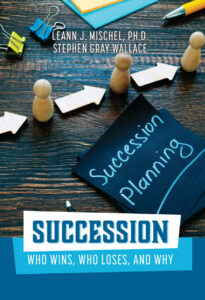 Succession offers “user’s guide” to small and family owned businesses through the stages of planning, employment. and ownership policies, shareholder meetings, family health emergencies, business planning, and alignment/engagement of employees. Covering both the positives and potential pitfalls inherent in the planning and implementation process, Succession represents a realistic roadmap to one of the more difficult periods of business ownership.
Succession offers “user’s guide” to small and family owned businesses through the stages of planning, employment. and ownership policies, shareholder meetings, family health emergencies, business planning, and alignment/engagement of employees. Covering both the positives and potential pitfalls inherent in the planning and implementation process, Succession represents a realistic roadmap to one of the more difficult periods of business ownership.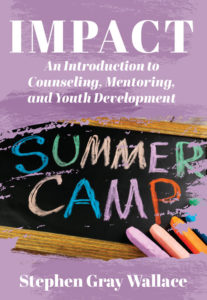 Stephen’s new book, IMPACT – An Introduction to Counseling, Mentoring, and Youth Development, offers insightful commentary on the important role of mentors in the lives of children and teens. While it specifically addresses camp counselors, it is equally relevant for all key youth influencers, including parents, teachers, and coaches. …
Stephen’s new book, IMPACT – An Introduction to Counseling, Mentoring, and Youth Development, offers insightful commentary on the important role of mentors in the lives of children and teens. While it specifically addresses camp counselors, it is equally relevant for all key youth influencers, including parents, teachers, and coaches. … This is an important time in teenagers’ lives — when they will develop driving habits that can be good and bad. Parents need to take an active role in helping teens develop safe driving behaviors because teenagers are involved in more car accidents than any other age group. …
This is an important time in teenagers’ lives — when they will develop driving habits that can be good and bad. Parents need to take an active role in helping teens develop safe driving behaviors because teenagers are involved in more car accidents than any other age group. …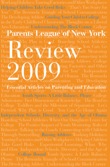 The Parents League Review is an annual literary journal with articles on parenting and education.
The Parents League Review is an annual literary journal with articles on parenting and education.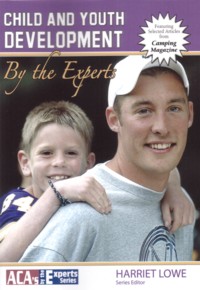 Child and Youth Development features eighteen articles that have been carefully selected from past editions of Camping Magazine, including Rites of Passage: Camp Pays Off in Youth Development, Happiness, Health, and Safety,” written by SADD Chairman and CEO Stephen Wallace. The contributing writers are recognized as authoritative voices in the field of child and youth development. Produced in cooperation with the American Camp Association. …
Child and Youth Development features eighteen articles that have been carefully selected from past editions of Camping Magazine, including Rites of Passage: Camp Pays Off in Youth Development, Happiness, Health, and Safety,” written by SADD Chairman and CEO Stephen Wallace. The contributing writers are recognized as authoritative voices in the field of child and youth development. Produced in cooperation with the American Camp Association. … This new book gives high school students the inside scoop on figuring out who they are and where they want to go by offering teens the kind of comprehensive, down-to-earth advice they need and want. …
This new book gives high school students the inside scoop on figuring out who they are and where they want to go by offering teens the kind of comprehensive, down-to-earth advice they need and want. … LOVE THAT BOY is a uniquely personal story about the causes and costs of outsized parental expectations. What we want for our children—popularity, normalcy, achievement, genius—and what they truly need—grit, empathy, character—are explored by National Journal’s Ron Fournier, who weaves his extraordinary journey to acceptance around the latest research on childhood development and stories of other loving-but-struggling parents.
LOVE THAT BOY is a uniquely personal story about the causes and costs of outsized parental expectations. What we want for our children—popularity, normalcy, achievement, genius—and what they truly need—grit, empathy, character—are explored by National Journal’s Ron Fournier, who weaves his extraordinary journey to acceptance around the latest research on childhood development and stories of other loving-but-struggling parents. 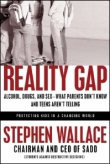 Reality Gap paints an alarming portrait of a modern-day adolescence filled with potentially deadly behaviors carefully hidden from the view of parents and other adults. But it is also a book about hope and inspiration, pointing to the incredibly powerful role that parents and other mentors can play in the lives of young people and highlighting the tremendous contributions that many teens are making to their families, schools, and communities. …
Reality Gap paints an alarming portrait of a modern-day adolescence filled with potentially deadly behaviors carefully hidden from the view of parents and other adults. But it is also a book about hope and inspiration, pointing to the incredibly powerful role that parents and other mentors can play in the lives of young people and highlighting the tremendous contributions that many teens are making to their families, schools, and communities. …